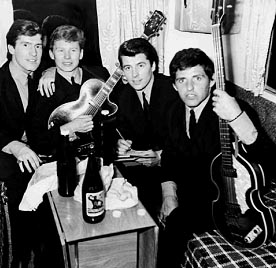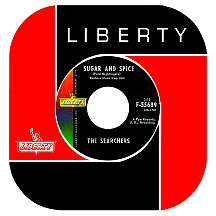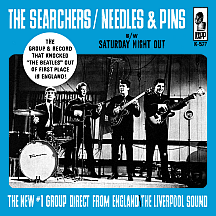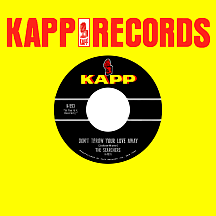THE SEARCHERS
Liverpool, that dreary, rainy, working-class port adjacent to the River Mersey, was a tough place for a kid to grow up. That is, unless he or she had been born sometime in the 1940s and was fortunate enough to reach adolescence without too much family trauma brought on by the consequences of World War II. Living in a lower middle class section of the Merseyside port certainly presented challenges. But imagine coming of age in the late 1950s surrounded by the exciting music scene with its teenage skiffle bands or the early '60s rock and rollers inspired by the sounds coming from the western side of the world, living in the same neighborhoods as future Hurricanes, Zodiacs, Dakotas, Pacemakers or Beatles, then dancing to them while they played in local clubs a few years later. Or how about being a member of one of those bands, of which there were literally hundreds? For a time in the '60s, the city was the center of the globe as far as trends in music were concerned; The Searchers weren't the best group to come from Liverpool...but they ranked very close to the top.
A few years before this Merseybeat movement took hold, the folky skiffle sound (Scotsman Lonnie Donegan its premier practitioner) implemented with basic, sometimes-homemade instruments, became an obsession for many British teens. Liverpool high schooler and guitarist John McNally began skiffling with friends in the late '50s; later, he and and guitarist Mike Pender had a thing for rock instrumentals. By 1959, their band of late-teenaged musicians included singer Johnny Sandon (born William Francis Beck), bassist Tony Jackson and drummer Norman McGarry, who was replaced after a short time by Chris Curtis (birth name Christopher Crummey). They named themselves after the popular 1956 western film The Searchers starring John Wayne.
For a couple of years, the band gigged in some of the city's "sweat cellars" and at one point the "Silver" Beatles were an opening act. By '61 the skiffle preference was on its way out; rock and roll was the happening thing and the Searchers (always dressed in stylish suits with ties even when other bands were casual if not rough-looking) made a few appearances at the Cavern Club on Mathew Street, formerly a jazz club that was inching closer towards a rock and roll mindset. They made a few Cavern appearances with the Beatles that year, then Sandon left the group and turned up as the singer for a competing local band, The Remo Four. The five-man Searchers had become four and stayed that way: McNally the leader, Curtis the percussionist, Jackson and Pender splitting lead vocal duties. A love of American rhythm and blues and a preference for material by female singers became part of their brand.
The Iron Door, located in the basement of a large warehouse, was a hot spot that catered to both the style-conscious "Mods" and rougher "Rockers" even before the Cavern had succumbed to rock and roll; the Searchers were regulars there for a time, doing "lunch time sessions" (a gimmick the Cavern had tried and been successful with) as well as late night shows that frequently caused a commotion with upwards of two thousand clubgoers. It was good experience for their "baptism of fire" in Hamburg, Germany, where they pulled a four month residency at the Star-Club, right around the corner from the city's red-light district, in late 1962 and early '63, a couple of years after hometown colleagues the Beatles and Gerry and the Pacemakers had made the rounds on the same streets, prior to the Star-Club's opening. One of the group's standard tunes performed nightly was The Drifters' 1961 hit "Sweets For My Sweet," which became their first release after signing with Pye Records. In August 1963, to the amazement of John, Mike, Chris and lead singer Tony, it became England's number one record.
Some of the Searchers' Hamburg gigs had been taped and Philips Records obtained those masters. "Sweet Nothin's," a wild rockabilly-style version of Brenda Lee's breakthrough hit, had a single release and made the U.K.'s top 50 in October (months later, an album of concert performances appeared in Germany on the Philips album Sweets For My Sweet..The Searchers at the 'Star-Club,' Hamburg; in the U.S. it was Hear! Hear! on Mercury). "Sugar and Spice," a song penned by their producer Tony Hatch under the name Fred Nightingale (he tricked the band and didn't tell them it was his), landed in the runner-up spot in November, behind Gerry's Liverpool Pacemakers.
"Needles and Pins" (or 'pinza' as enunciated by Mike), a Jack Nitzsche-Sonny Bono song, had been a minor U.S. hit for Jackie DeShannon the previous spring. British bands didn't have much luck in the States in 1963 (the two main Searchers singles, licensed to Mercury and Liberty, hadn't gotten off the ground), but once the Beatles broke through in early '64, all bets were off. Kapp Records secured the rights to the single, touting their recent success with a picture sleeve that proclaimed: "The group & record that knocked 'The Beatles' out of first place in England!," though a closer look at the chart shows The Dave Clark Five actually did the "knocking off" before "Needles" reached the top. It became their first U.S. hit in the early months of '64, falling a couple of slots shy of hitting what had become a competitive top ten crawling with Beatles (and DC5) songs. The disc's flip side, the theme from Saturday Night Out, which premiered in the U.K. in April, was performed by them in their only theatrical film appearance.
In May, "Ain't That Just Like Me," a rocking take on a '61 Coasters tune, and a reissue of "Sugar and Spice" put the simultaneous Hot 100 count at three. They scored another bullseye that month with "Don't Throw Your Love Away," a Billy Jackson-Jimmy Wisner tune released several months earlier as the flip of a 45 by The Orlons; Pender supplied the lead vocal as he had with "Needles and Pins" and the song became their third U.K. chart topper and second top 20 in America. Liverpool's stars (including real gone girl Cilla Black, who hit the top of Britain's pops twice in '64) were clearly dominating record sales and radio airplay in the U.K. in '63 and throughout many parts of the world in '64.
While they appeared on many U.K. television shows, the Searchers achieved something unique in America: they were on NBC-TV's The Tonight Show starring Johnny Carson, a rare occurrence since Carson usually catered to older viewers and seldom featured rock acts of the day. Their appearance, apparently, was more than a quick two-minute performance. The videotape of this episode has long since been lost (due to an ill-considered mid-'70s "erasing spree" that wiped out virtually all prior Tonight Show footage); the original TV Guide listing (Wednesday, June 10, 1964), gave this description: "The Searchers, one of Brtitain's top-rated rock 'n' roll groups, is featured in an extended segment."
Tony departed shortly afterwards and started his own group, Tony Jackson and the Vibrations (very odd that R&B act The Vibrations had a big American hit at precisely that time!), reaching the U.K. top 40 in the fall with a remake of Mary Wells' "Bye Bye Baby" (another strange coincidence: it came just as Motown's swinging door hit Mary on her backside). Jackson followed it with a cover of another of Mary's hits, "You Beat Me to the Punch." Mike Pender took over vocal duties for the Searchers and Frank Allen (a member of Cliff Bennett and the Rebel Rousers) replaced Tony on bass. Singles continued hitting; "Someday We're Gonna Love Again," a Barbara Lewis single that had just hit the U.S. radar a few months earlier, preceded another Jackie DeShannon cover, "When You Walk in the Room" (this one written by Jackie), top ten U.K. and top 40 U.S. late in the year.
For their next move, Kapp Records released a debut-LP Searchers track on the "Winners Circle" label, which was usually reserved for oldies reissues. A Jerry Leiber-Mike Stoller classic that had been a hit for The Clovers in '59 became the most popular of the the band's stateside hits. Former Searcher Tony had sung lead on "Love Potion Number Nine" and kept the original lyrics intact, including the part about being a 'flop with chicks...since 1956...' (a long romantic drought, just sayin'). It was the group's only American top ten, peaking in January '65 at number three on Billboard and number two on Cash Box (blocked from the top spot by Petula Clark's "Downtown"...produced by Tony Hatch)! Once aware the song was not being released in England, Tony Jackson took a similar approach with his Vibrations band (imitating his own vocals!), arranging it with a groovy organ backing. Alas, his alternate-but-similar version flopped.

Going in an entirely different direction, anti-h-bomb song "What Have They Done to the Rain" (penned by folk singer Malvina Reynolds) became their entry into 1965's "protest" trend and did well on both sides of the Atlantic. LaVern Baker's "Bumble Bee," a vital Searchers track from the vault, also got the "Winners Circle" treatment, spending a month in the U.S. top 30 while being passed over in the band's homeland. John McNally mastered the twelve-string guitar as song selections took on more of a folk-rock sound; "Goodbye My Love" (titled "Goodbye My Lover Goodbye" in the U.S.) was a major British hit, though their sixth and final effort to make the top ten. "He's Got No Love," an original by Curtis and Pender, made a solid top 20 showing and subsequent releases "When I Get Home," an inspired, perfect-for-'65 take on P.F. Sloan's "Take Me For What I'm Worth" and timely Jagger-Richards Aftermath number "Take it or Leave It" kept them cruising through mid-'66.
Drummer John Blunt stepped in as a replacement for Chris Curtis, who'd garnered a lot of attention for his harmonies and sometimes-untamed vocals during live shows. "Aggravation," his solo single on Pye, captured some of the manic energy but perhaps foreshadowed his feelings after failing to have a hit...or any further vinyl releases, for that matter. The Searchers, meanwhile, had their own issues to confront; the three-year whirlwind was winding down. "Have You Ever Loved Somebody," their last chart single in the U.K. in the fall of 1966, came just before Kapp dropped them; they were gone from the Pye roster by the end of the following year. Only two singles (on Liberty in the U.S. and World Pacific at home) appeared in '68 and '69. RCA Victor signed them in 1971 and "Desdemona" made a brief chart appearance. John McNally, Frank Allen and singer Mike Pender had been joined by Blunt's replacement, drummer Billy Adamson. The sound was updated and productions were tight but bore no resemblance to the band's string of hits.
After leaving RCA in '73 the group continued performing, though the venues got increasingly smaller. After six years without a record label they were signed by Seymour Stein of Sire Records, where they made new music until 1981. A final single appeared on the PRT label in 1982. In one of those one-becomes-two situations, Pender left in the mid-1980s and started Mike Pender's Searchers, while McNally and Allen kept the The Searchers going...for another three decades or so. They had lots of hit songs for fans to sing along with. Plus, they're from Liverpool. That's quite a pedigree in itself!
NOTABLE SINGLES:
- Sweets For My Sweet - 1963
- Sweet Nothin's - 1963
- Sugar and Spice - 1963
- Needles and Pins /
Saturday Night Out - 1964 - Ain't That Just Like Me - 1964
- Don't Throw Your Love Away - 1964
- Some Day We're Gonna Love Again - 1964
- Bye Bye Baby - 1964
by Tony Jackson with the Vibrations - When You Walk in the Room - 1964
- Love Potion Number Nine - 1965
- What Have They Done to the Rain - 1965
- Love Potion Number Nine - 1965
by Tony Jackson with the Vibrations - Bumble Bee - 1965
- Goodbye My Love (Goodbye My Lover Goodbye) - 1965
- He's Got No Love - 1965
- When I Get Home - 1965
- Take Me For What I'm Worth - 1965
- Take it or Leave It - 1966
- Aggravation - 1966
by Chris Curtis - Have You Ever Loved Somebody - 1966
- Popcorn, Double Feature - 1967
- Umbrella Man - 1968
- Desdemona - 1971
- Love is Everywhere - 1972
- Vahevala - 1972




